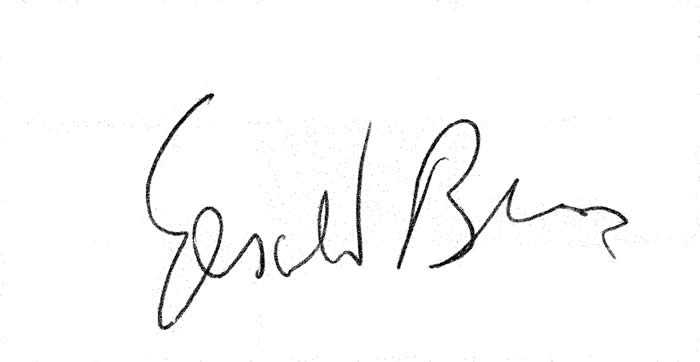
Sachlichkeit and finesse could perhaps come to terms in silver
lightning-stripes on black or death's-head caps, ranked. What'd
Milton have said to a sense of style in war, Satan minus the efforts
of the best Berlin tailor? Cromwell dressed in black, impressed ambassadors.
Punks in England, James Dean here, appropriated style. A raw-faced man
I see in the bakery wears the cap, without insignia, and field gray, buys books
on the Reich when he can afford them, his mind alone with God like the
subscribers to Guns and Ammo. Even a national language can be a style
though Symbolists wrote successfully in all languages, a mystery how Wordsworth
could write that way in The Excursion and not know he was. In Grass's novel
Matern spouts Schiller. In Duerrenmatt's The Pledge a bureaucratic policeman
loses his language, becomes an avenging peasant, almost a leech-gathering
survivor, reptilian, his speech not listenable to because not what he says
as I relate my past in the same words, indistinguishable from Eichmann.
I don't know how much a willingness to translate into fresh speech
is better than what I do, but believe it is. It's not the fixity, but that
seems to lead to swans trapped in ice, basalt monuments for Poe, fixed
attitudes, men like straw in ice as if my language saying this is
more corrupted than I imagine, allegiance to a kind of poetry even
exhibiting as Kafka's German never does diagnosis's aversion to cure.
My Liveright trade edition Hart Crane Collected Poems full of trick resolves
has eight extra leaves bound in to get to Hatteras as the first, oh, desirable
does not. I've nothing invested there, don't call him Hart, his Emily not
Howe's; I own none of them except a facsimile Harmonium, and no one.
Marlovian speech masks self-pity, pride, everyone in love with Faust,
even Valéry. I stuck the Cody Recommends card in a paperback on snakes,
green head like the ones I saw when not quite right, emphatically not mine.
Subjects aren't property, are subject to translation, Bridges' Milton's Prosody
for Scott, the scribbled Murry on Endymion not to be rebound, cat sunk
but not in esteem, not ever, a style then like grief in our economy.
So what am I to do with Nikki Giovanni's Gemini, so like in form and substance to Milton's
preface to Eikonoklastes, its arguments tart, full of feeling, sensible in their time and Charles, honky Satan,
spitting himself within? Even if each weren't honest they'd be good to read and Milton, political imbecile,
sounds less lying here, less drunk on his ability to find arguments as Hobbes's Rhetoricke urgeth, sincere inside
a gaudiness, a ring carved from beneath to make a cavity, coiled snake inserted to be visible enrubied there.
It's like knowing, on the rocks under the perilous foam fronting casements, there are lobsters.
Scott says Machiavelli in his youth saw pantomime dell'arte pieces, mountains opening to reveal fairies,
angels spinning in circles increasingly complex, as if Dante produced, all just complex enough
so something could go wrong, De Cive this, Behemoth a kind of crawl-on like Caliban.
See, I proffer my ugliness, my words speaking it, spit and hiss, drool, mud-man
as Hart, without a theoretical bone in his body, philosophizes about The Bridge
mistaking "weave" and "harp" for things because they're words, Charles's head rolling
off the boxwood block, indifferent to his blood as if t'were ink, mysterious as a looted TV.
"That the world might be fully confirmed in My purposes at first, to contribute what in Justice,
Reason, Honour, and Conscience I could, to the happy successe of this Parliament, I willingly passed the BILL
for Trienniall Parliaments: which, as gentle and seasonable Physick, might (if well applied) prevent any distempers
from getting any head, or prevailing; especially, if the remedy proved not a remedy beyond all remedy."
Impressed his factions, posthumously talking head, argument from celebrity enforced by woodcut.
Selden, learned jurist, declined the honor of rebuttal. (Milton thought he lost his sight by writing it,
but doctors say his optic nerve was unimpaired.) Scott has described to me a dustiness apparent in the eyes
of the newly dead, that seems to the survivor as if transition hides/reveals inside itself transition, as if
"moment" is the wrong word. Keats died with his hair soaked, as recorded in a watercolor by Severn.
Amber does not contain (reading a Japanese poet's translations of Japanese poems)
a drop of resin like a soft-centered candy, of the sort Keats thought he could
Copyright Gerald Burns 1995-1997